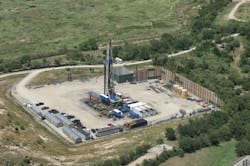Municipal News: Hydraulic fracturing wastewater ban, PFOA and PFOS quick facts
EPA formalizes hydraulic fracturing wastewater ban
PHILADELPHIA — June 14, 2016 — Under a new ruling by the U.S. Environmental Protection Agency (EPA), oil and gas operators can no longer dispose of hydraulic fracturing wastewater at public sewage plants.
Most companies stopped sending the waste to public plants in 2011 after former Pennsylvania Gov. Tom Corbett called for the stop to the practice. The ruling finalizes that practice because public water systems are not usually able to handle the kinds of waste that comes from unconventional oil and gas operations.
If the gas industry recovers, the new rule could mean more pressure on other disposal facilities in the Marcellus and Utica Shale regions, according to Clean Water Action Pennsylvania Director Myron Arnowitt. He says it is important to have the new rule in place before these rushes occur in the state.
WQA releases PFOA and PFOS quick facts
LISLE, Ill. — June 3, 2016 — The Water Quality Association (WQA) recently released information on how Perfluorooctanoic Acid (PFOA) and Perfluorooctane Sulfonate (PFOS) affect drinking water.
WQA notes that these contaminants are not naturally found in the environment but are man-made. PFOS is often used in larger polymers or as a simple salt, which PFOA is a synthetic salt, with ammonium salt the most widely produced form.
Studies show exposure to the chemical is widespread and that continued exposure to even low levels in drinking water could negatively affect human health. The EPA established a Provisional Health Advisory at 0.2 micrograms per liter (ug/L) for PFOS and 0.4 ug/L for PFOA. Several states also have regulations.
CA-NV AWWA offers assistance to California urban water systems
RANCHO CUCOMONGA, Calif. — May 31, 2016 — The American Water Works Association’s California-Nevada Section (CA-NV AWWA) will help the state’s urban water agencies produce validated system water audits through the new Water Loss Technical Assistance Program (Water Loss TAP).
The new $3.2 million program will train the water agencies over two years. It is part of CA-NV AWWA’s Water Loss Control Collaborative, which will aid systems that comply with California Senate Bill 555. The legislation requires urban retail water suppliers to submit an annual water loss audit report to the California Department of Water Resources by October 1, 2017.
CA-NV AWWA will provide training, technical assistance and water audit validation by about 450 of the state’s largest water systems through a grant by the California State Water Resources Control Board.
